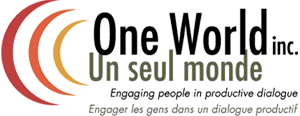Creating an Equal Playing Field in Democratic Society Through Dialogue
 In a democratic society, how important is it that all citizens have the same opportunity to engage? Do we want to hear different points of view, innovative ideas and creative solutions to problems? Of course we do, and as Canadians, we value active and fair participation and encourage important contributions and meaningful improvement. Yet supporting engagement in a Democratic society can be challenging and often, if the playing field is not level, important voices are not heard.
In a democratic society, how important is it that all citizens have the same opportunity to engage? Do we want to hear different points of view, innovative ideas and creative solutions to problems? Of course we do, and as Canadians, we value active and fair participation and encourage important contributions and meaningful improvement. Yet supporting engagement in a Democratic society can be challenging and often, if the playing field is not level, important voices are not heard.
Supporting engagement to ensure all voices are heard begins at home by raising awareness and educating people on the importance of involving everyone in the process, despite such limitations and barriers as physical disabilities, language or cultural differences. The benefits to be gained by creating a level playing field for active public participation far outnumber any that come from making choices and deciding outcomes without an open, participatory process.
Getting Past “Obligation”
From a societal perspective, there are challenges to supporting engagement. Similar to affirmative action, where the dilemma was created because people felt obliged, “We have to do it, it’s the law”, support for engagement requires the kinds of processes that educate and create awareness about what it means to be included despite physical, cultural, linguistic, and other barriers and limitations. The truth is, if we want to have the type of society that welcomes all people, then, it’s absolutely essential that we get past “obligation” and create an environment that fosters engagement from a different angle.
Tearing Down Barriers to Engagement to Create a Dynamic, Productive Society
A democratic system implies that all citizens should be able to play an active role in building the future of their society – that it is both a right and a duty to engage and share their views on important issues that effect their lives. As Canadians, we espouse this notion as a fundamental value and we need to be sensitized to the barriers that could prevent us from moving forward in this direction. We need to have the kinds of dialogue that will help us get past the “obligation” and embrace the kinds of conversations that will create a dynamic, productive society that capitalizes on the gifts and talents that each individual brings.
Whether it’s hearing, speech or vision impairments, language, culture or where one lives that prevent people from contributing, putting in place the means to remove these barriers to engagement will help us get the most out of the different talents, knowledge and perspectives that only an engaged citizenry can bring.
